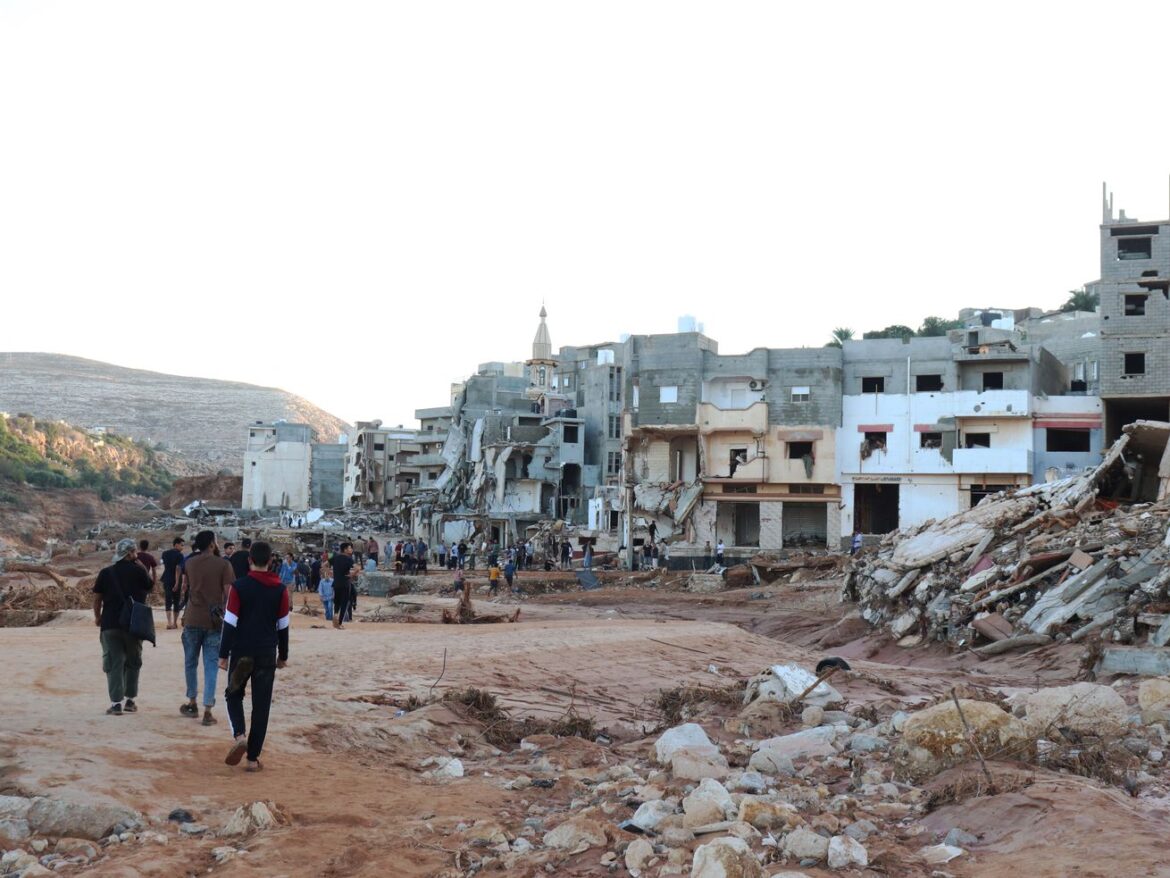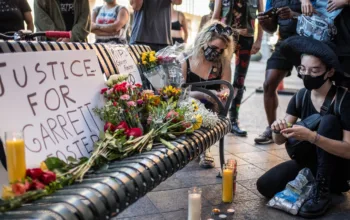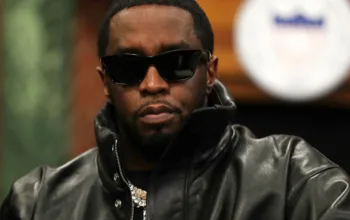The death toll is a tragedy decades in the making.
The storm and accompanying floods this week that have killed thousands in Libya was a natural disaster, likely compounded by climate change. But the magnitude of loss in Libya is inherently political — the failure of a divided, corrupt, and autocratic government of the past decade that was hastily built around Col. Muammar Qaddafi’s decentralized state and has been impeded by civil war.
At least 5,300 people have died and potentially thousands more are missing after torrential rain and catastrophic flooding occurred in Storm Daniel’s wake. The country’s eastern coastal city of Derna has suffered tremendously, with reports suggesting that about a quarter of it washed away after two dams collapsed. More than 34,000 people have been displaced. The city remains without phone lines or electricity, so the scale of the destruction could be higher. “We join the Libyan people in grieving the loss of too many lives cut short, and send our hope to all those missing loved ones,” President Joe Biden said in a statement.
“All of us are affected,” Anas El Gomati, founder of the Libyan think tank Sadeq Institute, told me. “The city was destroyed by climate change, that I can accept. But the people that are under the rubble today are because of man’s evil, and there is no other way to describe it.”
Storm Daniel, called a “medicane” for its origin in the Mediterranean and its resemblance to hurricanes, swept through North Africa. But unlike the earthquake that struck Morocco recently, storms can be predicted. There were three days of advance notice in which Libyan leaders could have ordered evacuations of cities and prepared for rescue crews.
/cdn.vox-cdn.com/uploads/chorus_asset/file/24919750/1663388533.jpg)
Satellite image (c) 2023 Maxar Tec
/cdn.vox-cdn.com/uploads/chorus_asset/file/24919753/1663037274.jpg)
Muhammad J. Elalwany/Anadolu Agency via Getty Images
It’s too soon to say why the dams in Derna collapsed. But experts note that the first of the two dams to fail, which was finished in 1977, has not been maintained in recent years. Libya may not be a rich country, but it is a petrostate with the resources that come from producing 1.2 million barrels a day. To not update essential infrastructure was either a political failure made by the government of Khalifa Haftar, the military strongman who runs eastern Libya, or the result of corruption. “It’s the negligence of men that are unappointed authoritarians that have been in charge of that place for the last several years,” El Gomati told me.
Not to mention that the dams that broke have needed maintenance since I was a child. https://t.co/WYf0wz7bwh
— Nour Joudah (@nsdoud) September 12, 2023
One reason that so much of Derna’s core has collapsed may also be due to the Libyan National Army’s plundering of public infrastructure for scrap metal and other potential sources of revenue, as detailed in a 2019 report by the Global Initiative Against Transnational Organized Crime. That may help explain the unbelievable scale of collapse.
“They’ve rotted that city from the inside out,” El Gomati told me. “I can’t get my head around the negligence.”
What Derna’s tragedy says about Libya
The problems of Libyan infrastructure predate 2011. Qaddafi, who ruled from 1969 until his assassination, deliberately decentralized the Libyan state to prevent coups, and doled out ministries to various tribal leaders without a broader coordination. Before his ouster, Libya didn’t look like anything that most analysts would recognize as a state, which was by design. Much of the current tragedy emerges from the Qaddafi model.
Lisa Anderson, a Columbia University political scientist, noted that, during his four decades in power, Qaddafi emphasized grandiose infrastructure projects while eviscerating the country’s technocratic expertise. The death toll from natural disasters like storms is a function of their power but, even more so, of how prepared a country is when extreme events strike. Libya was not ready. “Much of the disaster is not natural,” she explained. “This storm in the eastern Mediterranean also hit Greece, and six people died.”
/cdn.vox-cdn.com/uploads/chorus_asset/file/24919771/1662805825.jpg)
Turkish Disaster and Emergency Management Authority via Getty Images
The legacy of the 2011 Arab Spring protests, the ensuing NATO bombardment of the country, and its ongoing civil war also contributed to the lack of policy coordination. Today, the country is effectively split in two: A United Nations-recognized government operates out of Tripoli in the west, and the Haftar government runs the east. The civil war has decimated the already frail infrastructure of the country. And, according to Anderson, all that oil revenue is largely going to Swiss bank accounts and weapons purchases, not to ensuring the country’s governance. This collapse of central authority was inevitable in a country Anderson describes as “Somalia with oil.”
Libya has endured an incredible amount of tragedy in the past decade. Up to 3,400 civilians were killed in the NATO intervention, according to the watchdog Airwars, and in the decade that followed, the US launched over 550 drone strikes. The US’s close regional partners, Egypt and the United Arab Emirates, have enabled Haftar even though Russia also backs him. And then the US’s other regional partners, Turkey and Qatar, support the Government of National Accord in the western half. All those interventions have further deepened the conflict. The deaths in the ensuing civil war, according to a senior United Nations official, are “incalculable.” The conflict has displaced some 1.4 million Libyans since its outbreak, and even today there are still hundreds of thousands of internally displaced people.
Now, the autocratic, unelected government is already hampering the ability of aid workers and journalists to enter the country, El Gomati told me.
Assistant Secretary Leaf met with LNA commander Haftar to discuss the importance of supporting UN SRSG @Bathily_UNSMIL‘s initiative aimed at engaging all key Libyan political institutions and actors in setting a clear path to elections by the end of the year. pic.twitter.com/C2HN99SqBv
— U.S. State Dept – Near Eastern Affairs (@StateDept_NEA) March 20, 2023
As vice president, Biden opposed the US intervention in Libya in 2011, but he has inherited a mess where different US partners support different military factions in the country. Now, the US says it backs a UN initiative to get all sides to agree to elections by the end of the year. This year, CIA Director Bill Burns met with the Tripoli-based government and Haftar in Benghazi; the State Department’s top Middle East diplomat, Barbara Leaf, visited both, too. When she went to Libya, the US Embassy there tweeted in Arabic that she had expressed concern about the Wagner Group’s sabotage of Libya and its neighbors. But where were the comments about Haftar’s own bad behavior? He previously worked for the CIA, and last year, a Virginia court found him liable for war crimes, including torture and extrajudicial killing.
The United States must urgently step up with its global partners to address the calamity. And afterward would be a good time to rethink its support for strongmen in the region, which in the era of climate catastrophe will likely lead to entirely new types of disasters.
One thing the US could do is coordinate assistance among its Middle East partners who have nuanced and contrasting interests in Libya. “Everybody’s going to send their humanitarian assistance to the militia that they already know, to the government they already know, to the strongman they already know,” Anderson told me. “So it’s going to exacerbate rather than ameliorate the underlying problems.”
Anderson pointed out that the Biden administration’s Middle East policy is “hard to understand,” and acknowledges it will be challenging to quickly course-correct. “In these kinds of emergency circumstances, it’s pretty difficult to have a different approach,” she told me. “There are lots of ways the United States could be putting its thumb on the scale in Libyan politics that would not require direct intervention and could actually begin to bring people to the table.”



